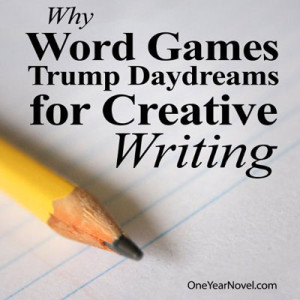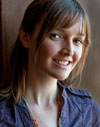Why Word Games Trump Daydreams
Guest post – Tineke Bryson, Staff
 The Crocodiles Should Eat the Pie
The Crocodiles Should Eat the Pie
I daydreamed ferociously when I was a kid. Nothing pleased me so much as slipping away from people and situations to hunt fancies in my head. And why curb my imagination? Wasn’t daydreaming my source of creative ingenuity? I trusted to imagination to achieve my dream of becoming a writer, or, as I put it then, a “poetess”!
My dad had the irritating habit of pulling me out of reveries with word games. “Look at that!” he would say, gesticulating enthusiastically at an exquisite sunset or the flash of a bird’s feathers. “What would be the best word to describe that color?”
Ugh. It drove me crazy. Didn’t he realize I wanted to absorb that very beauty from the solitary vantage point of my castle in the air? Gathering up my interrupted dignity, I would emerge from my castle walls to entertain his question, angry with myself because I knew, deep down, that my dad was trying to do me a favor. He believed in me as a writer, and he thought these silly word games would help me. He wasn’t aware of how lofty and inspired my daydreams were—he didn’t know my fancies were going to turn the literary world upside-down.
After serving up a word or two to please him, I would turn and sweep back through the gate, back to my daydreams, with a stern word to the captain of the guard not to disturb me again. What did I keep him for? Why did I stock my moat with boredom-eating crocodiles if it wasn’t to ensure I could queen over Dreamland in peace?
I still have a woolgathering habit. Who am I kidding? I am an expert at the brown study, for what it’s worth.
But what is it worth?
Daydreaming gives me a taste for the magical, the beautiful, the thrilling, but it also teaches my imagination to be lazy. It tries to get away with feeding me the same scenes, the same characters, the same words and experiences. It is confident I won’t notice—I mean, it has tricked me into wiling more hours away than I ever want to count. But I’ve cottoned on. It may be sly, but I am growing wise. Slowly.
I completed an honors degree in creative non-fiction in college. But I followed that up with months of artistic dormancy that eventually turned into years. I’m almost 29 now with nothing much to show for those twenties.
I now get it. I get it. Flights of fancy do little to satisfy my voracious hunger for originality and creative vision. The discipline of precision is where it’s at.
My dad hit the nail on the head. Every time we played his “silly” games, he drove a supporting nail into my abilities as an imaginative thinker. He taught me to work for my words, work for the entrancing quality I loved in good writing. Finding the most precise word—the word that, when struck, rings—takes effort. Effort and concentration. It requires the opposite of staring into space. It requires that I pay attention.
And I hate paying attention. It’s, you know, work.
But lest I give up before I begin, hunting precision involves play as well as work. Its wisdom, gained with years, paradoxically requires childlikeness, playfulness. This too my father understood. That’s why he wanted to play games with me.
I enjoyed playing by myself as a child, but I loved playing with other imaginative kids. The charge of converging minds sparked ideas I could not invent alone. There is nothing quite like exchanging grins over an absurdly fantastic idea.
How true this is for writers! We can sharpen our wit and whimsy with each other. We can play games. Find the very best word. Twist an idea to find its breaking point. Strike a thought for its clearest tones. Pay attention. To a world of bird feathers on the wind and setting suns on frenzied water. To a world of preposterous detail and flurry that only the fastest minds can catch by the tail.
By far my favorite person to chase words with is my husband. He has the best grin. When we startle some hidden detail into flight, our laughter is long and awed.
Find that person, those people. Find the people who will play and work with you for what is precise, astounding, true.
Push your imagination. Push it to run after the world’s tailcoat, tail feathers, tail lights. Catch your word if you can.
Don’t disappear into your castle. Behind your back, the castle guards throw the best thoughts to the crocodiles. If you turn around, you’ll discover it’s true.
Crocodiles don’t deserve precise words, strong words. Let them eat your pies in the sky. You go and join the chase. Tear after the world’s mightiest words with every last reserve of concentration. Write.
 About Tineke
About Tineke
Tineke (TEE-neh-keh) Bryson loves words. Collecting them, studying them, and trying to present them to advantage, whether by writing or editing. And if this metaphor hasn’t been hint enough, she also actually collects insects; especially colorful giant moths. Growing up in Benin, West Africa, Tineke learned to love languages and cultures, and she and her husband, Matthias, love to travel (or, when the purse is empty, read about interesting places instead). Before working for Daniel and Carrol Schwabauer, Tineke studied creative non-fiction at Houghton College and then worked as an editor. Taking The One Year Adventure Novel class live last year gave her a lot of reasons to now try her hand at writing fiction.



I love this.
Thank you! I’m glad! It was fun to write and inspired ME. By the time I finished it, I was so fired up!! 🙂
Tineke, you FOUND wonderful, precise words that struck and rang to express your thoughts in this. I loved this piece of writing! I’m going to print it and read it to my kids. Can’t wait to read your novel one day…
Thank you so much, Angie! If your kids like to daydream as much as I do, they may not thank you for that! 😉